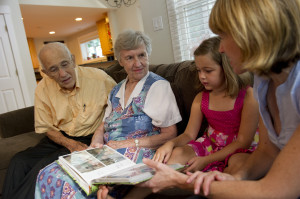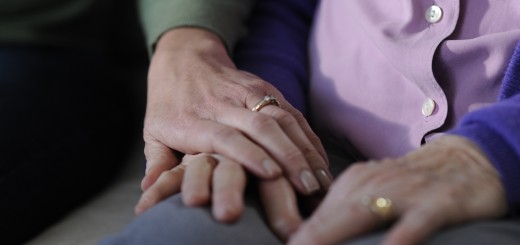Preserving Memories
 For people who have been diagnosed with Alzheimer’s Disease, yesterday can be difficult to recall, but yesteryear can still be totally intact. Before the disease progresses too far, it is a wonderful idea to try and capture fading memories. Capturing the past provides personal insights and stories relating to both your loved one and the entire family. As an added bonus, an effort focused on preserving memories can be both a nice family sharing activity, as well as a therapeutic and comforting process for your loved one.
For people who have been diagnosed with Alzheimer’s Disease, yesterday can be difficult to recall, but yesteryear can still be totally intact. Before the disease progresses too far, it is a wonderful idea to try and capture fading memories. Capturing the past provides personal insights and stories relating to both your loved one and the entire family. As an added bonus, an effort focused on preserving memories can be both a nice family sharing activity, as well as a therapeutic and comforting process for your loved one.
Caregiving Team’s Journal
If your loved one does not express interest in participating, you can undertake a less direct route. A journal can be created (an online blog can easily be set-up) with family members, friends and the caregiving team as contributors. All can be encouraged to share and document their past memories and stories relating to your loved one, as well as the current day’s events. With a little sleuthing, caregivers can open up sharing opportunities, perhaps showing a loved one a photo or prop (football, trophy); “Cousin John is starting high school. I remember you were on the football team in high school, I wonder if John will play football”. You may get a response that can be shared via the journal, “Dad talked about his high school football games today; he remembered his team won the regional finals!” There is a site that offers an online, private depository for a caregiving team – including extended friends and family – to input a variety of stories, photos and messages (with or without the involvement of a loved one); the information can be turned into a hardcopy book.
Photo Album
A simple collection of older photos can be placed in an album, and family members can use the photos to prompt a loved one – and other family members – for stories. Stories can be documented, and later added to the album. Be careful to not put your loved one on the spot when prompting for stories. Don’t ask, “do you remember” type questions, or anything that sounds like quizzing. Ask open-ended questions to encourage sharing. Sometimes just admiring or describing what you see in the photos will prompt a recollection or story. A photo album can be a powerful security blanket for your loved one to hang on to when in stressful situations or unfamiliar places.
Interest Scrapbook
If you don’t have old photos, start a scrapbook on a loved one’s favorite interest. Get props (a model of that old car Gramps used to drive, Grandma’s handmade quilt) focused on the topic (gardening, sports), and/or have your loved one pick out photos from magazines. Add any stories that come along. If Grammy was a superb cook, try and document favorite recipes along with memories she may have of holiday traditions that involved those foods.
Video
Record Grandpa singing with the grandkids. Transfer old VHS tapes, photos and slides, and add those to the video. If your dad is up to the task, interview him. Ask questions reminiscing major life events like his time in the Navy or his wedding day. Don’t force difficult emotions (Dad may remember the horror of war, not his Navy buddies). Record holiday traditions, like the Thanksgiving family meal. You can do this yourself, although there are videographers who will do it for you.
Hometown Visit
Many old memories can be evoked by a visit to a person’s hometown, either their original house or neighborhood, school or church. Special mementoes can also evoke memories: keepsakes stored at a family home, childhood awards, etc. If your loved one is up to the excitement – and chaos – of a family reunion, that is a wonderful opportunity for sharing memories and getting photos or video of multiple generations together. Just remember travel can be challenging for someone with Alzheimer’s disease.
Biography
If your loved one is in the early stage of the disease, and willing, you can plan ongoing interviews to more fully document their lives. An excellent example (from an Alzheimer’s program specialist with the Greater Iowa Chapter) of topics and questions you might ask, can be found here.
Whatever you decide to do to preserve your loved one’s memories, just start today. Celebrate your loved one’s life and build future generations’ connections to your loved one’s past. And once completed, don’t forget to share your album with your loved one’s caregiving team, so they can better see the person and not just the illness.
Blog written by Alzheimer’s Association Volunteer Diane Blum
Click here for more caregiver tips and expert advice from Family Care Specialist Stephanie

















